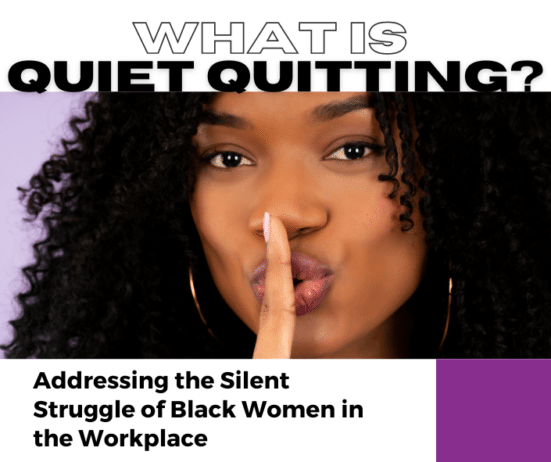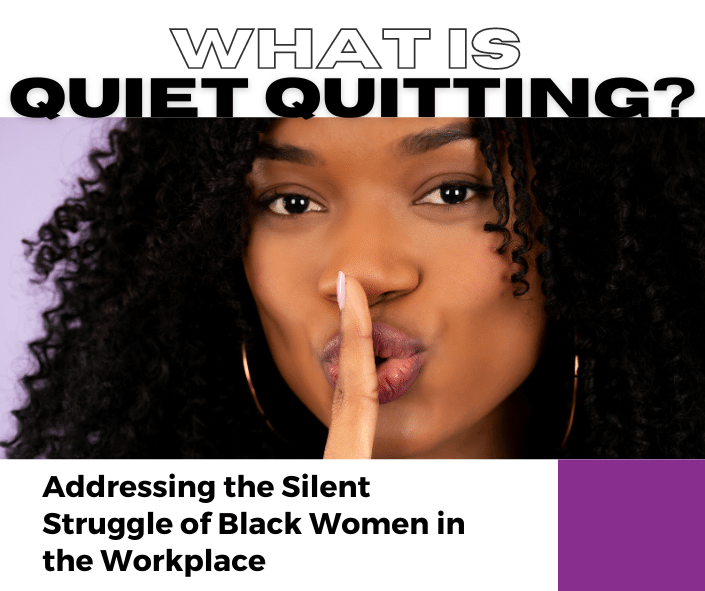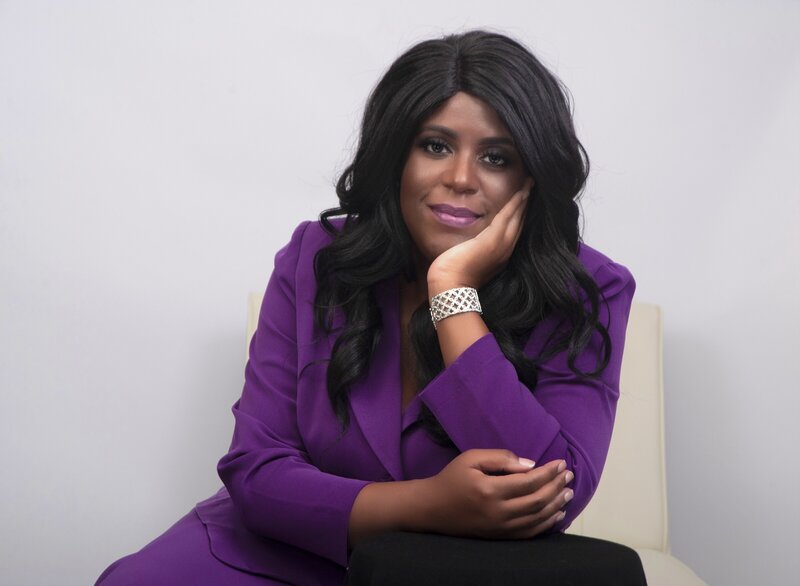September 15, 2024
Addressing the Silent Struggle of Black Women in the Workplace
What Is Quiet Quitting?
Aisha* is a talented and driven Black woman who has spent over a decade climbing the corporate ladder to become a director. Every day, she walks into her sleek, modern office, a space that should reflect her hard-earned success and leadership. Yet, behind her confident facade lies a growing sense of sheer exhaustion and frustration. Despite her achievements, Aisha feels increasingly invisible. The microaggressions she endures have begun to chip away at her self-esteem.
This is what quiet quitting looks like. Once passionate about her role, Aisha now finds herself disengaging more and more, reducing her contributions to only what is absolutely necessary. A silent retreat from a job that once brought joy, now a source of persistent disappointment and alienation. Aisha’s story illustrates the painful reality of quiet quitting faced by many Black women who struggle with being undervalued and unheard in their workplaces.


Understanding Quiet Quitting
What is quiet quitting? Quiet quitting is when you limit your engagement to only what’s required by your job descriptions and disengage from going beyond those expectations. This behavior usually reflects deeper issues such as burnout, lack of recognition, or poor management. For many Black women, quiet quitting may be a response to ongoing microaggressions and a pervasive sense of being overworked while also being undervalued or unheard.
Envisioning the Ideal Workplace
In an ideal work environment, every employee should feel appreciated, heard, and included. Leadership should actively foster a culture of support and inclusivity, ensuring that everyone has the opportunity to contribute their best and be recognized for their efforts. When employees feel valued and supported, they are more likely to engage fully and contribute positively to the organization.


The Road to Quiet Quitting: Understanding the Journey
Quiet quitting often emerges as a reaction to systemic issues in the workplace. For many Black women, this means dealing with microaggressions, feeling undervalued, overwhelmed, and feeling isolated.
For example, I went above and beyond at a particular job about 14 years ago. The year before I had received a sizable bonus that really came in handy for a single parent with three kids. Our director came on board in our large staff meeting and confirmed, you’ve to got perform above and beyond your job to earn a bonus.
So that following year, I went the extra mile, documenting my work with local and statement governments. Helping clients for a team member who were outside my assignments. Doing exactly what the director said I needed to do to earn that bonus again.
Evaluation time rolled around, and my boss said I wasn’t getting a bonus. I reminded him of the director’s guidance. He actually told me “I didn’t tell you to work extra. And I’m not giving you a bonus because you performed above your duties. Just consider yourself as having donated some extra work to our organization. Thank you.” That was my second time quiet quitting a job. For me, it was about self preservation. And a defense to feeling dismissed and undervalued.
My client, Kayla*, frequently found herself mistaken for a lower-level role, despite holding a leadership position. This repeated misidentification not only affected her morale but also increased her feelings of isolation at the company. As a result, Kayla started withdrawing from additional responsibilities and opportunities for advancement. A form of quiet quitting driven by her frustration and sense of isolation.
These stories highlight why quiet quitting is more than just a personal issue; it reflects broader systemic problems that impact job satisfaction and professional growth. When Black women face these challenges, their overall engagement and morale suffer.
The Cost of Quiet Quitting
Quiet quitting is not only a personal issue but also a financial one for organizations. Disengaged employees can significantly impact productivity. According to Gallup, disengaged employees came at a cost of $1.9 trillion in lost productivity. This results in substantial financial losses, especially when the disengagement stems from unresolved workplace issues like microaggressions and lack of recognition.
Additionally, high turnover rates, often a consequence of quiet quitting, lead to increased recruitment and training costs. When valuable employees like Aisha and Kayla quiet quit due to feeling unsupported, the organization incurs extra expenses related to hiring and onboarding new staff. Addressing the root causes of quiet quitting can help reduce these costs and contribute to a more stable and engaged workforce.
Solutions and Their Benefits
To tackle quiet quitting and support Black women effectively, organizations can implement several strategies:
- Foster Inclusive Leadership: Train leaders to recognize and address microaggressions and ensure diversity in leadership roles. Inclusive leadership helps create a more welcoming environment and reduces the likelihood of disengagement.
- Implement Feedback Mechanisms: Establish regular check-ins and anonymous feedback channels for employees to voice their concerns. This approach helps identify and address issues early, fostering a culture of openness and support.
- Promote Equity in Recognition and Advancement: Ensure fair recognition and advancement opportunities for all employees. Transparent criteria for promotions and rewards help eliminate biases and promote a more equitable work environment.
- Build Supportive Networks: Develop mentorship programs and professional development opportunities tailored to the needs of Black women. Access to mentors and networking opportunities can help mitigate feelings of isolation and support career growth.
- Encourage Open Dialogue: Create safe spaces for discussing workplace experiences and challenges. Open dialogue helps employees feel heard and valued, leading to meaningful changes and improved engagement.


Breaking Free from Quiet Quitting
Quiet quitting often signals deeper systemic issues in the workplace, particularly for Black women who face unique challenges. But here’s a surprising and empowering way to tackle this issue: proactively create your own support network and professional development plan. This approach not only addresses the root causes of disengagement but also fosters a sense of agency and belonging. Often for Black women, quiet quitting is about surviving a difficult work environment until you level up to a better position.
Start by seeking out mentors and allies within your industry who understand your experiences and can offer guidance and support. Also seek support outside of your industry. Building these connections can provide you with valuable perspectives and opportunities, helping you feel more valued and less isolated. Additionally, invest in your own professional growth by pursuing new skills or certifications that align with your career goals. This proactive approach can reinvigorate your passion and open doors to new possibilities.
As an executive coach, I often play a pivotal role in empowering Black women who are experiencing or considering quiet quitting. As a coach I can help you clarify your goals, build confidence, and develop strategies to navigate workplace challenges effectively. Through personalized coaching, you can gain insights into how to advocate for yourself, manage microaggressions, and leverage your strengths to achieve a more fulfilling career. This support can transform your work experience, helping you reclaim your passion and thrive in your professional journey.
Have you experienced quiet quitting in your career? Share your stories and insights in the comments below. How have you addressed these challenges? What changes would you like to see in your workplace?
Here’s a video I created about how quiet quitting secretly sabotages your career. Check it out and let me know you thoughts. Send me an email at twanna@twannacarter.com


I’m an ICF Professional Certified Coach (PCC) and career coach for Twanna Carter Professional & Personal Coaching, LLC. I failed my first career transition from the military so badly, it took me the next 10+ years to build my confidence and recover. I know what it feels like to struggle with imposter syndrome and uncertainty about my worth in the workplace. It’s why I am dedicated to empowering Black women. Helping them navigate career change and uncertainty by providing them with the tools and strategies they need to be successful. Schedule a free 30-Minute Career Solution Call today.
Discover the Magic Within: Grab Your Copy of Melaninated Magic – 180 Empowering Affirmations to Elevate Your Spirit and Embrace Your Black Girl Joy
Unleash your inner strength and radiate positivity with Melaninated Magic. This affirmations journal is crafted specifically for Black women to nurture your soul and amplify your confidence. Inside, you’ll find 180 powerful affirmations designed to uplift, inspire, and celebrate your unique journey. Embrace each day with renewed purpose and joy, and let your Black girl magic shine bright!
Curated Reading List
- “Melaninated Magic: 180 Affirmations to Nurture Your Soul and Unleash Your Black Girl Joy ” by Twanna Carter, PhD
- “I’m Not Yelling: A Black Woman’s Guide to Navigating the Workplace (Successful Black Business Women)” by Elizabeth Leiba.
- “Crucial Conversations: Tools for Talking When Stakes Are High” by Kerry Patterson, Joseph Grenny, Ron McMillan, and Al Switzler.
- “Burnout: The Secret to Unlocking the Stress Cycle” by Emily Nagoski, PhD
- “Influence: The Psychology of Persuasion” by Robert B. Cialdini.
- “How to Win Friends and Influence People” by Dale Carnegie.
- “Lean In: Women, Work, and the Will to Lead” by Sheryl Sandberg.
- “Dare to Lead” by Brene Brown.
- “The Memo” by Minda Harts.
- “Atomic Habits: An Easy & Proven Way to Build Good Habits & Break Bad Ones” by James Clear
- “Worthy: How to Believe You Are Enough and Transform Your Life” by Jamie Kern Lima
- “Negotiating While Black: Be Who You Are to Get What You Want”, by Damali Peterman
Read my latest blogs…
- The Fear-Based Leadership Cycle Secretly Running Your Life. And How to Break ItFear is a powerful emotion. It can protect you, warn you, and heighten your awareness. But when fear begins to lead you, especially… Read more: The Fear-Based Leadership Cycle Secretly Running Your Life. And How to Break It
- Redefining Success. How Black Women Executives Are Leading a New Era of Authentic LeadershipThe New Leadership Trend. Redefining Success Across boardrooms, Zoom calls, and LinkedIn feeds, a powerful shift is underway. Women of color, especially Black… Read more: Redefining Success. How Black Women Executives Are Leading a New Era of Authentic Leadership
- How to Quiet the Inner Critic and Stop Second-Guessing Yourself in High-Stakes RoomsUnderstanding the Inner Critic Your inner critic is that persistent internal voice that judges, doubts, and second-guesses you. Ooften at the worst possible… Read more: How to Quiet the Inner Critic and Stop Second-Guessing Yourself in High-Stakes Rooms
- The Survival Blueprint. What To Do Immediately When You Realize You’re Being Managed OutUnderstanding What “Being Managed Out” Really Means. And Why Immediate Help Matters The first time I realized I was being managed out, I… Read more: The Survival Blueprint. What To Do Immediately When You Realize You’re Being Managed Out
- 10 Powerful Reasons Why Black Women Entrepreneurs Are Leading the Rise of EntrepreneurshipWhy Black Women Entrepreneurs Are Leading the Rise of Entrepreneurship Entrepreneurship has always symbolized courage, innovation, and self-determination. And no one represents that… Read more: 10 Powerful Reasons Why Black Women Entrepreneurs Are Leading the Rise of Entrepreneurship
- The Leadership Myth That Hurts High-Achieving Black Women. Why Slowing Down Doesn’t Make You Weak.Slowing Down Doesn’t Make You Weak Leadership isn’t just about speed, stamina, or sacrifice. It’s about authenticity, vision, and sustainable strength. Yet, a… Read more: The Leadership Myth That Hurts High-Achieving Black Women. Why Slowing Down Doesn’t Make You Weak.
- Quiet Cracking -7 Signs You’re Not ‘Fine’. You’re Burning Out in SilenceUnderstanding Quiet Cracking Quiet cracking is a modern mental-health phenomenon that describes the slow, invisible unraveling of your emotional resilience. TalentLMS reports that… Read more: Quiet Cracking -7 Signs You’re Not ‘Fine’. You’re Burning Out in Silence
- Top 10 Powerful Reasons for Career Change. Why It’s Never Too Late to Start FreshUnderstanding the Need for a Career Change Changing careers is no longer rare. It’s the new normal. Today, professionals across industries are re-evaluating… Read more: Top 10 Powerful Reasons for Career Change. Why It’s Never Too Late to Start Fresh
- The Hidden Cost of Being the Strong One at WorkThe Unseen Weight of Being the Strong One at Work At every office, there’s usually one person everyone leans on, the dependable one,… Read more: The Hidden Cost of Being the Strong One at Work




















+ show Comments
- Hide Comments
add a comment